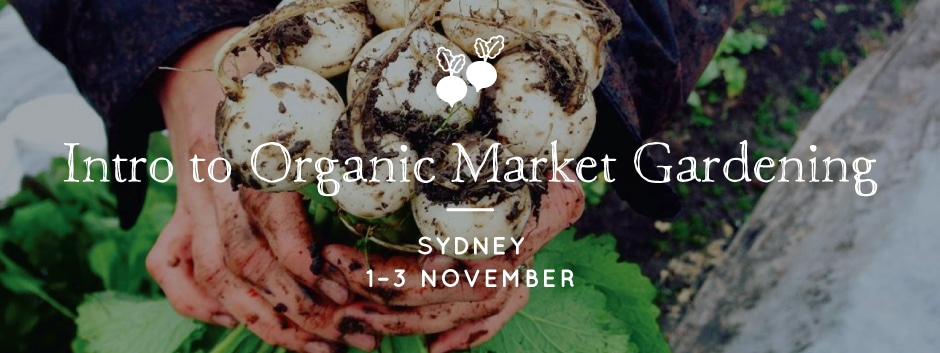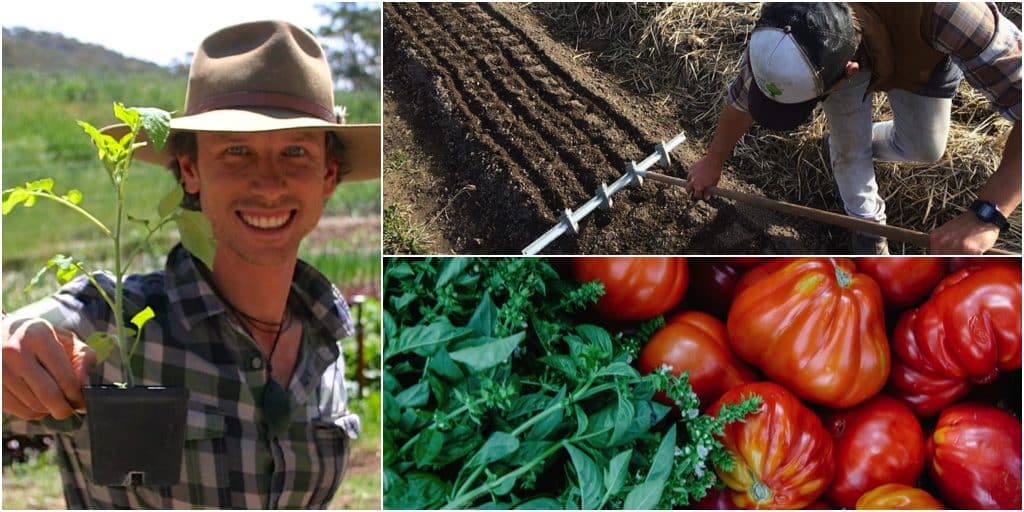5 Things every Future Farmer needs to know – with Olivier Sofo of Living Earth Farms
Author: Kirsten Bradley
Go to Source
So you want to grow your own organic food, and some for your community, too? We sit down with Olivier, half for the award-winning Living Earth Farm team AND the teacher of our Intro to Organic Market Gardening course, to chat about his top 5 things that every future farmer needs to know before they begin.
As we all know, local food systems are vital to strong communities. This means that supporting, and growing, local veg and fruit is an integral part of great health outcomes for entire towns, as well as increasing community resilience for all of us.
And we see more and more folks who are dead-set on growing good food for their communities on rental plots and spare paddocks, it’s becoming clear that we can all be involved in either growing, supporting or advocating for more locally grown food.
For the future growers who take up this challenge of feeding their communities, there’s a lot to learn before you break ground – tools, knowledge, defining your markets, designing for your context (and your lease terms), water availability, soil issues, compost supplies and systems, and so much more.
Yes, small scale market gardening is totally doable and even quite possible to make a good livelihood from, but you need to do things right – and plan well from the start to ensure your success.
Farming as a family on rented land…
Someone who knows all about growing great veg on rented land and making a family livelihood from it is Olivier + Falani Sofo, who farm 1/2 an acre of rented land near Mittagong, NSW. We’ve known Olivier since he was an intern at Milkwood Farm (back in the day!) and it’s been amazing to watch him flourish into a seasoned and experienced market gardener. Over the years, Olivier has worked on many acclaimed organic farms, including multiple seasons managing Michael Abelman’s Foxglove Farm market garden in Canada.
These days, Olivier farms with his wife & farming partner Falani. and their two littles on rented land in Mittagong as Living Earth Farm. Living Earth supplies beautiful chemical-free veg to some of Sydney’s best restaurants and suppliers.
In the past, Living Earth Farm has also done a local CSA box scheme, but after their second baby Falani and Olivier decided to focus on restaurants for a year or two. This decision was part of adjusting their markets to their available capabilities for the given season – to prevent burnout, and to ensure good food and health for the whole of their community, which must, of course, include the farmers!
Olivier has been teaching our Intro to Organic Market Gardening course in Sydney for a few seasons now, and we LOVE bringing his knowledge to a new cohort of future farmers twice a year. Part of the course is run at Pocket City Farm in Sydney, and part of the course is taught at Living Earth Farm so that students can experience Olivier’s successful growing enterprise on the ground, in detail.
Olivier’s top 5 things to know before you grow:
Ok so apart from exactly what species of raddiccio you’re dreaming of planting, and the fact that small farms and community supported agriculture are obviously fabulous… what are some of the areas that you need to really think about, before you begin? Here’s Olivier’s top five…
Start with a solid business plan
And also a farm vision – for you, and for your family. As an enterprise, what will you be? What, both broadly and specifically, will your grow? Who will be involved in this enterprise, and on what levels? And, most importantly, clearly define what you want out of your farm on an ecological, economic and on a social level.
Define your community
Define specifically who are your customers. Where is your market place, and how will getting there affect how you need to plan your weekly work? Where will your employees (or future employees, if you’re starting small) come from, and how will you find them? Are you positioned to expand your sales beyond your community if needed?
It’s also vital to consider the other parts of your community, which will intersect with your enterprise just as much as the nuts and bolts – simple questions like where will you send your kids to school can have a huge impact on small enterprises, and on everyone’s available energy.
Define your water sources
This one is simple….no water, no life. Make sure you have at least 2 solid water sources for irrigation. So – town water and dam, or dam and bore, or multiple dams, or some other combination of reliable, non-interconnected water sources that are accessible to you.
Importantly, to the math and ensure that your water sources have the capacity to see you though each summer of growing for the plot size you intend to plant, with extra to spare. Water can often be one of the most limiting factors for growth – for both your crop, and for your enterprise.
Secure land acquisition
Whether you purchase or lease land, you will be needing long tenure-ship, so ensure this from the start. Natural systems farming is a long game and it takes some years to really develop your skills and ability as a grower – this is true on any piece of land.
If you are leasing: nut out the fine details before beginning, and allow for annual reviews. Keep in mind that money can be a more preferable exchange than labor when it comes to negotiating a lease. Value your time!
Observation, perseverance and education
We are not reinventing the wheel by growing food plants. There have been many, many folks before us who know what we are trying to do, and what we are trying to learn. Read, research, trial, take notes, walk, look, ask and listen, diligently – each and every day. Lastly, don’t be put off by hardship. This happens on every farm, as there will always be problems to solve. Ask for help when you need it, figure out a solution, and keep going (and growing). Good luck!
Thanks, Olivier!
If you’re keen to get growing and want to learn from one of the best, our spring Intro to Organic Market Gardening course, taught by Oliver, just happens to be coming up this November in Sydney…
So what’s in the course?
- Strategies for garden design, planning & layout
- Tools, resources and other considerations
- Propagating healthy seedlings
- Bed preparation
- Soil fertility and management
- Designing appropriate crop rotations
- Harvest & storage
- Irrigation strategies
- Strategies for establishing and leveraging markets for your produce
Using a combination of classroom time and on-farm learning, Olivier will take you through how to plan your garden layout, make beds, plant a variety of crops, plan what goes where, strategise for integrated pest management and prepare for a bumper harvest.
As part of this course, we’ll be spending time at Pocket City Farm, an enterprise growing local food using organic growing techniques on rented + unused land in the middle of the city. We’ll also take you to Living Earth Farm for a day, for hands-on learning and understanding how Olivier & Falani have put their highly successful peri-urban market garden enterprise together.
We’ll see how they grow and interact with their markets, from direct supply of restaurants to food boxes and other suppliers. And you’ll leave this course bursting with ideas and strategies for starting your own enterprise.
Sound good? More information about & bookings for this course are here, and the earlybird rate is available until September. Numbers are limited to ensure great learning outcomes for all students.
“Olivier presented in such a way that all the info was super easy to absorb. He clearly knows his stuff and presented in an easy to learn way – peppered with humour and anecdotes. Olivier’s passion for market gardening is obvious and I came away really believing I could be successful at all this, and full of enthusiasm. I can’t imagine anyone more qualified or suited to present this course” – Biffy, Spring 2019
Need more inspiration about folks growing great veg without owning their plot? Or what tools to use? Here’s some further reading for you…
- Permaculture Futures: Linda Machon, Organic Farmer
- The Weekday Farmers Market as Community Activator
- Three fold-up Farmstand ideas
- Wagtail Urban Farm, Adelaide: Grower Profile
- 5 fave organic market gardening tools: Michael Hewins
- Drill-powered Microfarming: Slow Tools for Humanity
Image credits: Pics 1, 2, 3, 5 & 6 by the fabulous Luisa Brimble, for Sift Produce. Thanks, legends!
The post 5 Things every Future Farmer needs to know – with Olivier Sofo of Living Earth Farms appeared first on Milkwood: permaculture courses, skills + stories.










